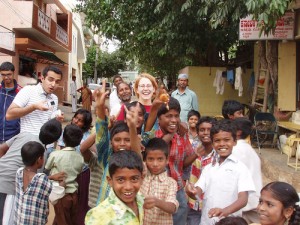so begins the last week of my time in india. for those of you not reading the other girlwonder, i've been in bangalore, india for the last 6 weeks, working with microsoft research india, though i never had expected to find myself working at microsoft (i am, after all, a former netscape person), it's been wonderful to be here. i have always wanted to go to india but began getting interested in it from a research perspective last spring. a lucky conversation at the social computing symposium with someone from MSR india (and me being cheeky enough to ask if i could come to bangalore) had me on a plane a month later.
being here is having a pretty profound impact on how i see things. it's hard for that not to be the case. the picture here is from our visit to bangalore's largest slum, where 2000 families live in a tiny area. we visited and interviewed three families, sitting on the floor in rooms the size of a small walk-in closet (that were the homes of families of five to seven people). we talked to women who never really completed school and so are functionally non-literate. we talked about children and food and education and when exactly am i going to get married? despite india's segregating class system, muslim and hindu women mixed easily with each other, joking that the only contract is that they have three children (they each did). in the mornings, they are domestic workers (and members of the domestic workers' union). effectively, they are cooks or housemaids in middle class homes.
bangalore relies on its slums. many of the auto rickshaw drivers live in a slum; many of the domestic workers do. and yet these private parcels of land will be developed and the people sent away. they're fighting to stay. where would they go, when they've lived here their whole lives? yes, they want better housing, but what happens if the entires social fabric disintegrates? the women we visited weren't only friends–they rely on each other when things go wrong, when school fees need to be paid and there's a problem in a family. their children go to school together. to dismantle that seems a bad thing. the kind of help they need is systemic and massive. i want to help. but what and how?
slums don't exist the same way in the US–this is a developing world phenomenon. this week, i've been reading slum city, the new mike davis book.

Hi
I got interested in the last line you wrote (verything else I am already aware of, since I work in the urban development sector, an I agree with you on the plight which faces the slum dwellers at present).
You said slums don't exist in the US. A lot of my friends say the same. But are you really sure about this. I mean, under what category are the "Projects" classified. I hope no offence is taken, since this is toally out of curiosity to understand a place I haven't yet been to.